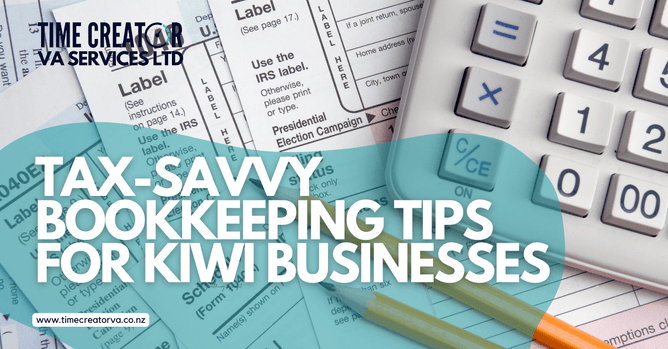Tax-Savvy Bookkeeping Tips for Kiwi Businesses
Bookkeeping isn’t just about numbers – it’s about smartly managing your finances while staying compliant with New Zealand’s tax laws. From GST to income tax, here are some straightforward tips tailored to help Kiwi businesses navigate bookkeeping with tax efficiency in mind.
1. Separate Personal and Business Finances, Especially for GST:
In New Zealand, businesses with a turnover of $60,000 or more per year are required to register for Goods and Services Tax (GST). To simplify GST reporting and compliance, it's crucial to keep personal and business finances separate. Open separate bank accounts and maintain clear records of all business transactions to calculate and claim GST credits accurately.
2. Choose the Right Accounting Method for Tax Purposes:
In New Zealand, businesses have the option to use either cash-basis or accrual - basis accounting. While cash-basis accounting may seem simpler, especially for smaller businesses, accrual-basis accounting provides a more accurate reflection of your financial position. Consider which best suits your business and tax obligations
3. Accurately Track and Categorise Expenses for Tax Deductions:
Maximising tax deductions is a common goal for businesses in New Zealand. To ensure you're claiming all eligible expenses, maintain detailed records of your business expenses and categorise them appropriately. From office supplies to vehicle expenses, every deductible expense can help reduce your taxable income and minimise your tax liability.
4. Understand the Basics of Provisional Tax:
Provisional tax is a system used in New Zealand to pay income tax in instalments throughout the year, based on your estimated tax liability. Its essential to understand your provisional tax obligations and budget accordingly to avoid penalties and interest charges. Keep accurate records of your income and expenses to estimate your tax liability more effectively.
5. Stay Informed about Tax Changes and Compliance Requirements:
New Zealand's tax laws and regulations are subject to change, so it's vital to stay informed about any updates that may affect your business. Subscribe to official tax updates from the Inland Revenue Department (IRD) and consider working with a tax professional who can provide guidance on compliance matters and help you navigate any changes effectively.
6. Optimise Effective Business Structures:
Choosing the right business structure can have significant tax implications. Whether you're operating as a sole trader, partnership, or company, each structure has its own tax obligations and benefits. Consider seeking advice from a tax advisor to determine the most tax-effective structure for your business and personal circumstances.
7. Maintain Impeccable Records for Tax Audits: In the event of a tax audit or review by the IRD, having thorough and organised financial records is essential. Maintain accurate records of all income, expenses, and supporting documentation to substantiate your tax filings. Being prepared for potential audits can help mitigate any issues and ensure compliance with tax laws.
Conclusion:
By following these simple tips, you can manage your bookkeeping efficiently while optimising your tax position as a Kiwi business. Remember, staying informed and proactive is key to financial success in New Zealand.
‘Til next time,
Elizna



